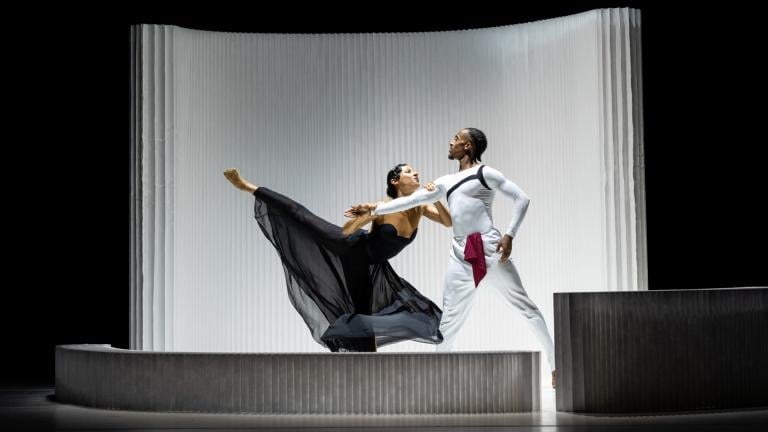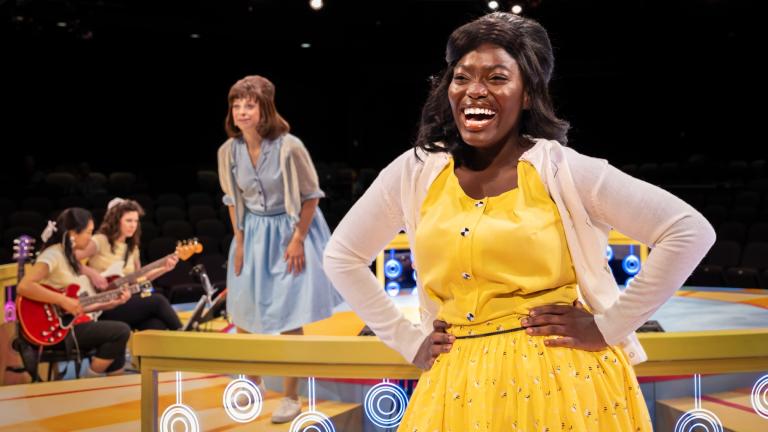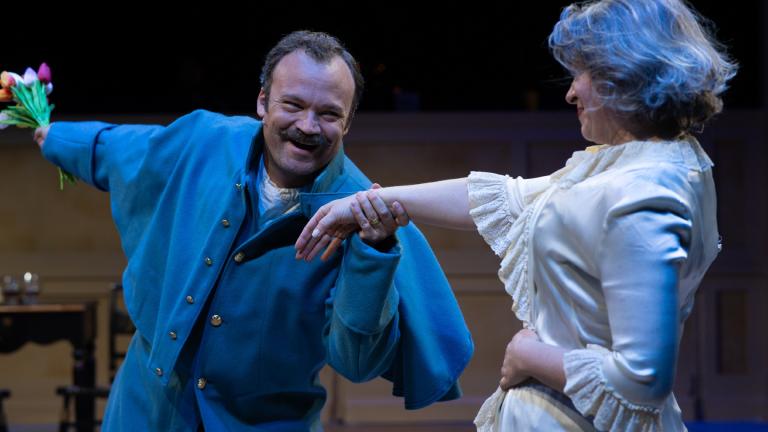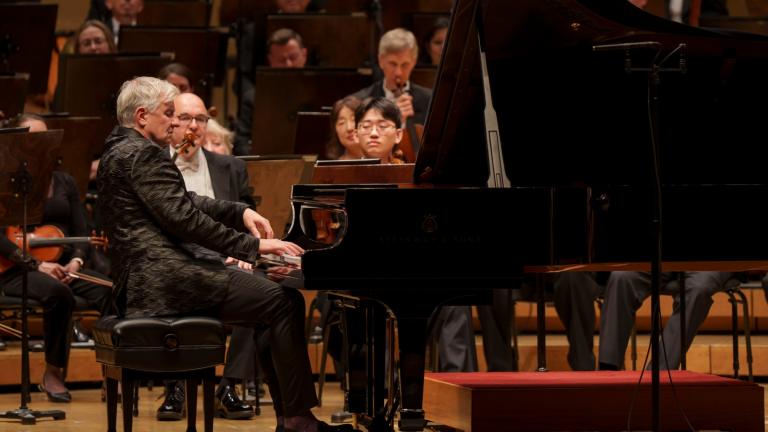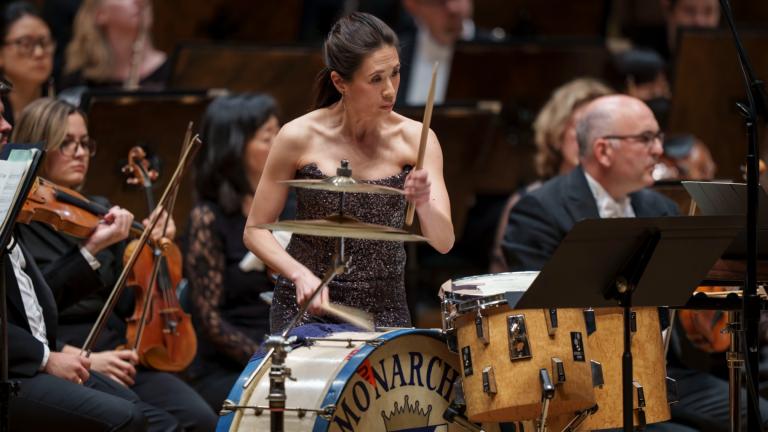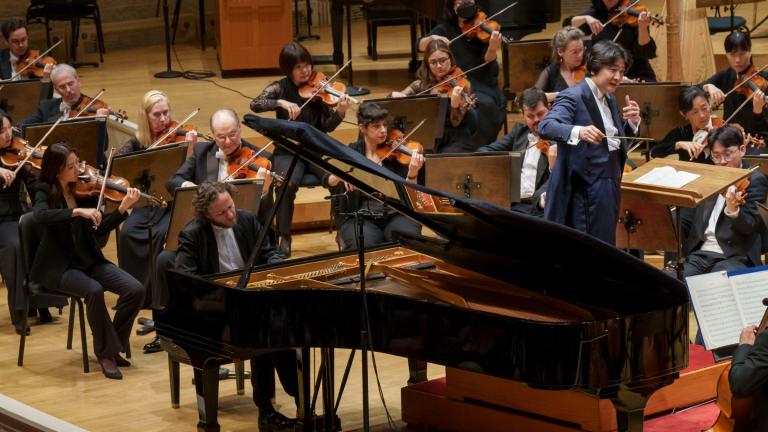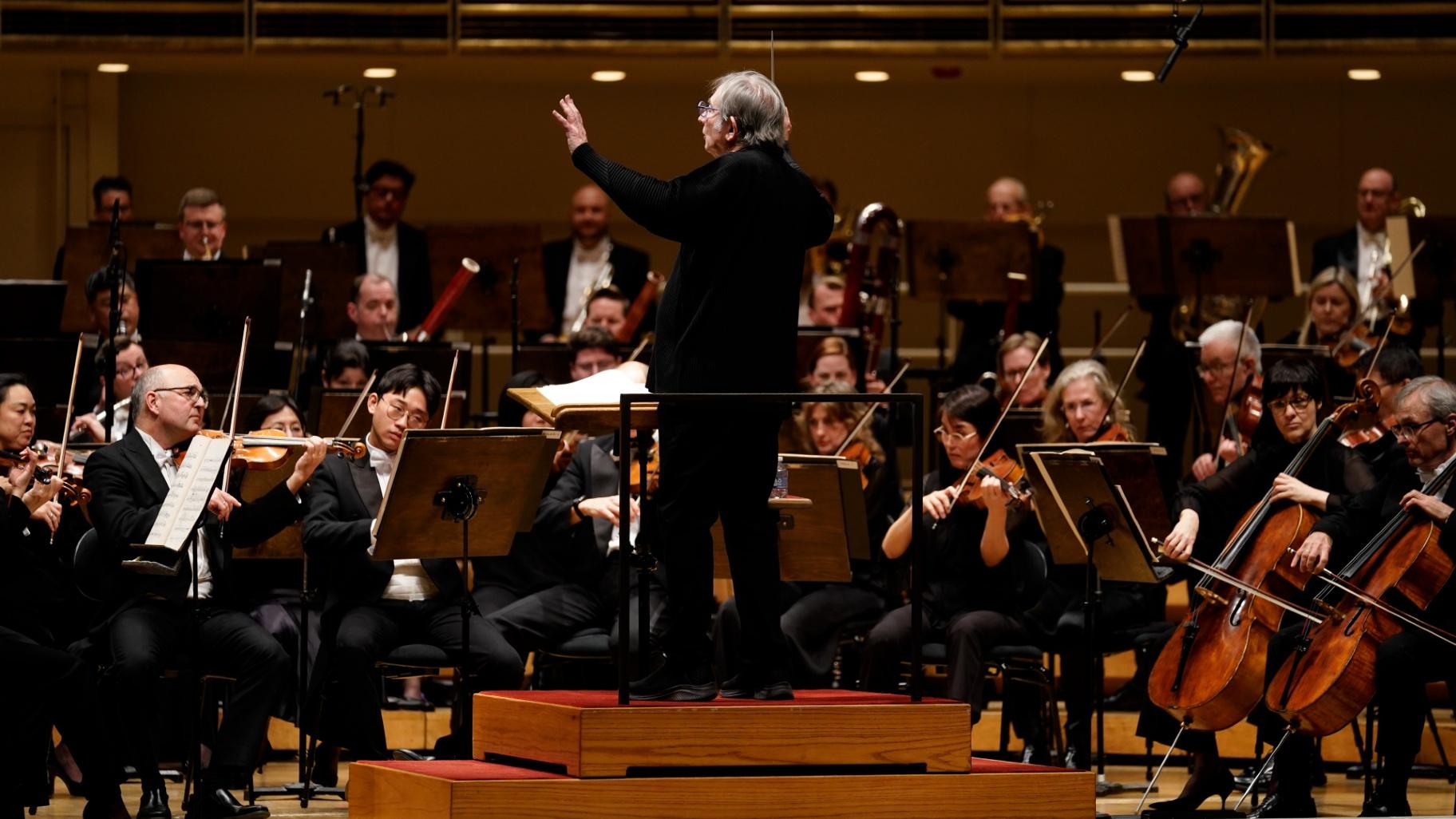 Conductor Michael Tilson Thomas leads the Chicago Symphony Orchestra in a performance of Schoenberg’s orchestration of Brahms’ “Piano Quartet No. 1.” (Nuccio DiNuzzo Photography)
Conductor Michael Tilson Thomas leads the Chicago Symphony Orchestra in a performance of Schoenberg’s orchestration of Brahms’ “Piano Quartet No. 1.” (Nuccio DiNuzzo Photography)
To borrow a line from Shakespeare — “If music be the food of love, play on” — I confess that a twist on that line quickly came to mind Thursday evening as I watched guest conductor Michael Tilson Thomas arrive on stage at Orchestra Hall to conduct the Chicago Symphony Orchestra in works by Mozart and Brahms, with the phenomenal pianist Orion Weiss as guest artist. My twist was this: “If music be the food of healing, play on.”
Tilson Thomas, 78, who was diagnosed with a form of brain cancer in 2022, looked rather frail as he carefully walked on stage trailed by a stagehand for safety. But once he made it up the two steps to the podium and took hold of his baton, he seemed to be almost instantly transformed. And for the next couple hours, he led the ever-remarkable musicians of the CSO (with Stephanie Jeong, the ever-formidable associate concertmaster and violinist, at his side) in works by Mozart and Brahms, with a palpable sense of energy, clarity and visible delight at every turn.
The concert opened with Mozart’s brief but exuberant “Six German Dances,” scored for strings, winds (including a beautifully performed riff on piccolo by Jennifer Gunn), brass and timpani. Pure delight. Then came a knockout rendering of Mozart’s “Piano Concerto No. 23 in A Major,” with Weiss bringing his bravura technique to an immensely challenging work and, more notably, subtly capturing the amazingly modernist elements in a work dating from the 1780s.
As an ideal encore Weiss performed Debussy’s fully modern (and exquisitely dreamy) “Etude pour les arpeges composes No. 11,” one of a series of pieces dating from 1915 that came with the composer’s warning to pianists “not to take up the musical profession unless they have remarkable hands.” To be sure, Weiss’ hands (and interpretive skills) are remarkable.
Two concerts at Orchestra Hall in late November also deserve mention. The first featured the CSO with guest conductor Philippe Jordan and violinist Leonidas Kavakos, who played a concerto by the early 20th century Polish composer Szymanowski. The program also included a vivid rendering of Mussorgsky’s “A Night on Bald Mountain” and a sensational performance of Igor Stravinsky’s “The Rite of Spring,” that landmark work from 1913 that continues to astonish with its dazzling rhythms and brilliantly dramatic use of every section of the orchestra.
Paying a notable one-night visit (Nov. 28) to Orchestra Hall as part of its U.S. tour was the Staatskapelle Berlin, one of the world’s oldest orchestras. The program, featuring two Brahms symphonies, was to be conducted by Daniel Barenboim (music director of the CSO from 1991-2006), but due to a pervasive illness he had to cancel his appearance. Stepping in for him at the last minute was Jakub Hrusa, the exceedingly gifted Czech conductor who had just finished leading the Lyric Opera in performances of Janacek’s highly demanding work “Jenufa.”
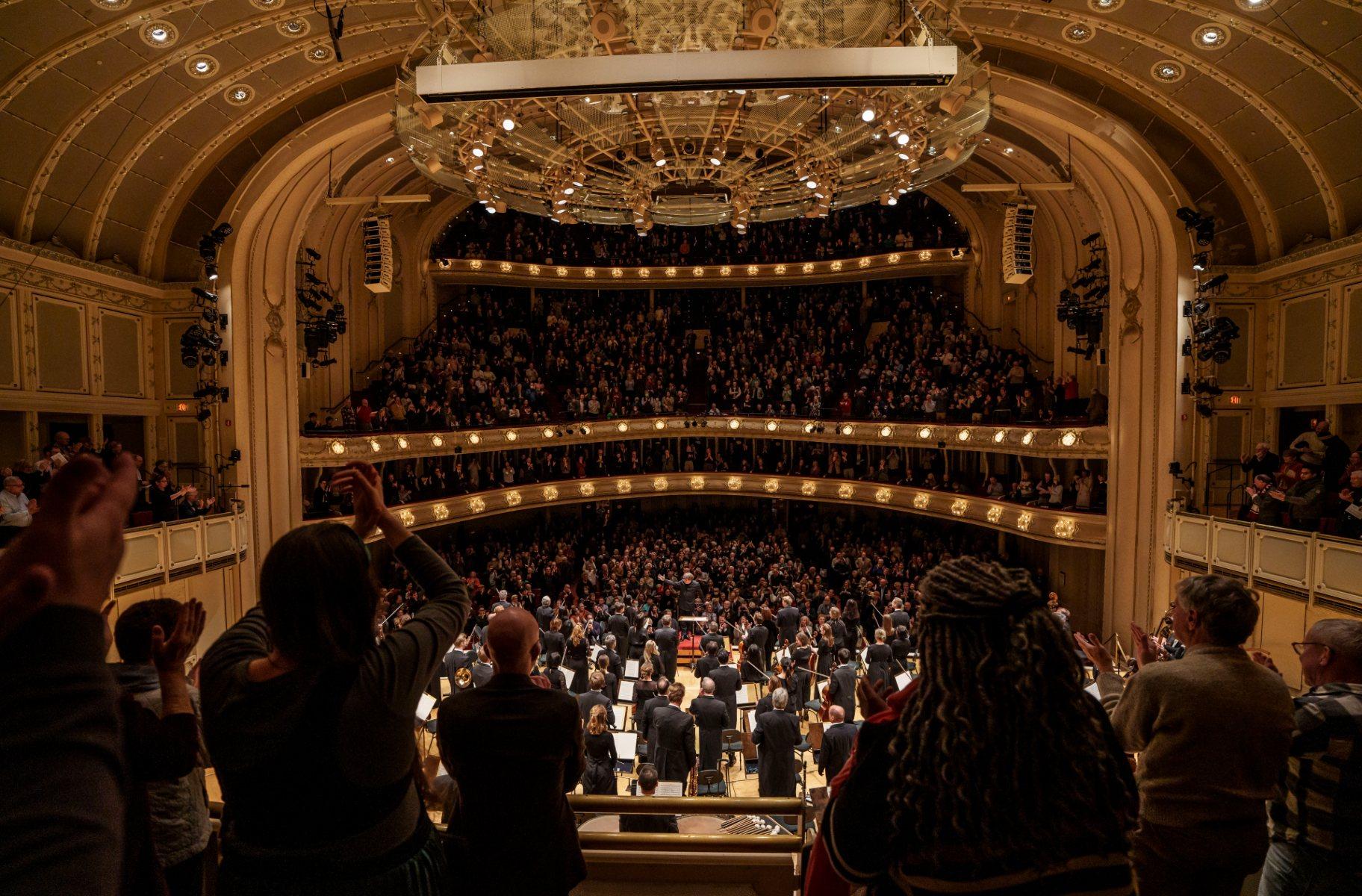 Conductor Jakub Hrůša and the Staatskapelle Berlin acknowledge audience applause following a performance of Brahms’ “Symphony No. 1.” (Todd Rosenberg)
Conductor Jakub Hrůša and the Staatskapelle Berlin acknowledge audience applause following a performance of Brahms’ “Symphony No. 1.” (Todd Rosenberg)
Hrusa and the Staatskapelle Berlin joined for a powerful take on Brahms’ “Symphony No. 3 in F Major,” a work whose opening movement continually shifted from stormy themes to sequences of lyrical beauty. The second movement, also with frequent mood swings, had a warm, singing quality, while the familiar melodies of the third movement came to an end with a great romantic surge and plucked strings. The fourth and final movement began with a great sense of urgency and a big bang and grew to a heated finale. Both Brahms and the Staatskapelle Berlin were at their very best.
And now, about the Lyric Opera’s production of Donizetti’s immensely entertaining, status-conscious opera “The Daughter of the Regiment,” performed in early November and expertly directed by Laurent Pelly and conducted by Speranza Scappuci. It was absolutely sensational, with bravura turns by soprano Lisette Oropesa (who displayed a remarkable flair for comedy and drama, as well as vocal brilliance, in the role of Marie) and Lawrence Brownlee, the superb bel canto, in the role of Tonio, her determined lover. But every member of the cast was impeccable. The audience stopped the show with its applause after nearly every aria.
And a few more musical notes:
Coming up at Orchestra Hall on Dec. 7-9 is a CSO concert with guest artist Hilary Hahn performing Brahms’ “Violin Concerto” on a program that also will include Sibelius’ “Symphony No. 7” and Wagner’s prelude to “Tristan und Isolde.”
On Dec. 14-16, the heralded conductor Semyon Bychkov will lead the CSO in Saint-Saens’ “Violin Concerto No. 3” (featuring guest violinist Renaud Capucon), as well as Dvorak’s “Carnival” overture and Brahms’ “Symphony No. 4.”
On Dec. 19 the Chicago Symphony Orchestra Brass, led by conductor Michael Mulcahey, will play traditional favorites and masterworks arranged for a brass ensemble. And on Dec. 21-23, Sir Andrew Davis will lead the CSO in Handel’s “Messiah,” with the nearly 100 voices of the Chicago Symphony Chorus perched above the stage.
For tickets to the CSO, visit cso.org or phone (312) 294-3000.
And last but not least: Do not miss Chicago Opera Theater’s production of “The Nose” at the Harris Theater for Music and Dance, playing at 7:30 p.m. Dec. 8 and 3 p.m. Dec. 10. Based on a zany short story by the Russian author Nikolai Gogol and set to a score by Dmitri Shostakovich, the production is being directed by Francesca Zambello and conducted by Lidiya Yankovskaya. “The Nose” knows! For tickets, phone (312) 334-7777.
Note: This review has been updated to reflect that Jakub Hrusa and the Staatskapelle Berlin, not the Chicago Symphony Orchestra, performed works by Brahms on Nov. 28.
Follow Hedy Weiss on Twitter: @HedyWeissCritic

